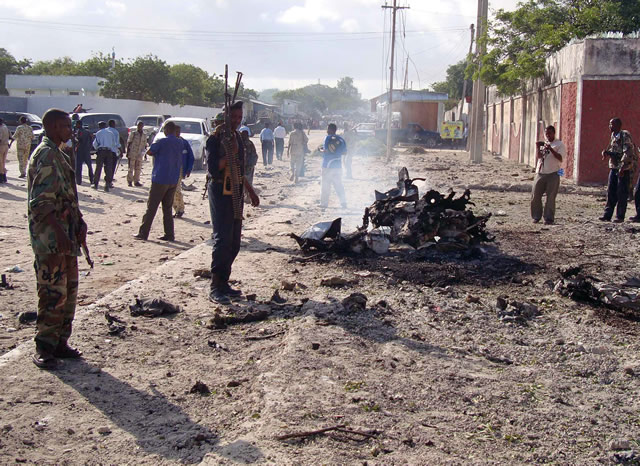Suicide Blast in Somalia Raising Concerns at Home
Scott Erickson /

Somalia government soldiers secure the scene of a suicide attack that killed at least three people on October 18, 2011 in Somalia's wartorn capital, Mogadishu. AFP PHOTO / Abdiwahab Haji
Following a devastating suicide blast earlier in the week in Somalia’s capital city of Mogadishu, leaders from the regional terror group al Shabaab issued a statement declaring that the perpetrator of the attack was American Abdisalan Hussein Ali.
In an audio tape released by al Shabaab, and purported to be of Abdisalan Ali, the speaker exhorts the virtues of jihad and calls on his Western brothers to join the fight: “My brothers and sisters, do jihad in America, do jihad in Canada, do jihad in England, anywhere in Europe, in Asia, in Africa, in China, in Australia, anywhere you find kafir (unbelievers). Fight them and be firm against them.”
Ali, 22, had been raised in the predominately Somali-American communities around Minneapolis. His transformation from a popular high school student to an Islamist radical willing to die for jihad underscores several disconcerting phenomena facing the American homeland, most notably that of domestic radicalization and the growing threat posed by foreign fighters.
Earlier this year, the Homeland Security Policy Institute issued a report addressing the increasing concern surrounding the emergent threat posed by the foreign fighter. Characterized as one raised largely within Western society and culture, the expression of the foreign fighter’s radicalization manifests itself as the individual travels overseas, often to his ancestral land, to continue his course into jihad.
The foreign fighter phenomenon poses a significant threat to Western countries. In traveling overseas to join a terrorist movement, the individual brings with him a unique understanding of Western culture and provides terrorist organizations with a highly desirable commodity: a Western defector whom they can use and trot before the media.
Foreign fighters also pose a grave threat to their Western countries of origin. Having traveled overseas and experienced a level of terrorist training unlike what could be obtained at home, upon return the foreign fighter represents a far more sophisticated threat than that posed by individuals whose radicalization remained either local or cyber in nature.
If their surreptitious travel overseas goes undetected, foreign fighters can return to their Western homelands and employ their terrorist inclinations in devastating ways. They possess an extensive level of training and experience coupled with an indispensable ability to travel freely within the country—critical elements to fomenting a potentially lethal act of terror.
Over the past few years, the United States has seen several occasions in which American-born residents have traveled overseas to join and fight for terrorist organizations. Many notable incidents have involved foreign fighters drawn from the Somali-American communities around Minneapolis. In September, Anwar al-Awlaki, a Yemeni-American Islamist radical who became a leader of al-Qaeda in the Arabian Peninsula, was killed in a CIA drone strike in Yemen.
